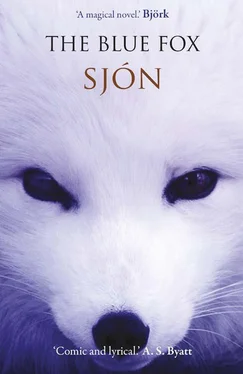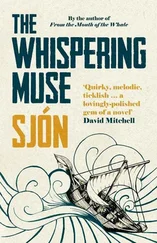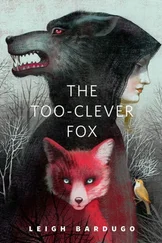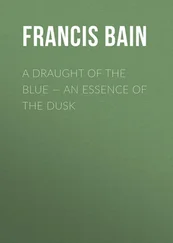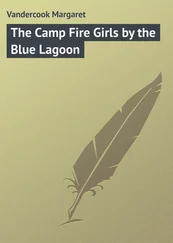‘Hello, I’ve come to fetch the hemale horse, listen, I’m here to take the female porks, oh, er, no, er, you, no, hand over the heehaw forks…’
In the yard at Brekka a horse stands beneath a man, and it is the man who is babbling so inanely to himself. He’s a big fellow, probably turned forty; there’s grey in the pink beard which hangs untrimmed over his mouth and tumbles from his chin like an ice-bound cataract — yet he is bundled up in clothes like a child all set to spend the day in a snowdrift.
His breeches are hitched right up to his crotch, his coat is far too big or far too small, depending on how you look at it, and his knitted hat is tied so tightly under his chops that he cannot have done it himself; on his hands he wears three pairs of mittens, making it almost impossible for him to hold the reins of the hairy nag on which he sits.
This is the mare Rosa. She champs her bit impatiently. It is her legs that have carried them here. When you look back you can see her hoofprints running from the parsonage at Dalbotn, down over the fields, along the river, across the marshes, up the slopes, to the place where she is now standing, waiting to be relieved of her burden.
Ah, now the man clambers down from her back.
And his true shape is revealed: he is extraordinarily low-kneed, big-bellied, broad-shouldered and abnormally long-necked, and his left arm is quite a bit shorter than his right. He stamps his feet, beats his arms about himself, shakes his head and snorts.
The mare flicks her ears.
‘Sea-hail porpoise?’
The man scrapes the snow from the farm door with his stubby arm:
‘Can it be?’
He knocks on the door with his good hand and feels the blood rushing to his fist. It’s cold. Perhaps he’ll be invited inside?
The shadow of a man’s head appears in the frost-patterned parlour window, and a moment later the inner door can be heard opening, then the front door is thrust out hard. It clears away the pile that has collected outside overnight, and the cold visitor, retreating before it, falls over backwards, or would do if the snow allowed. When he is done falling, he sees that the man he has come to find is standing in the doorway: Fridrik B. Fridjonsson, the herbalist, farmer at Brekka, or the man who owns Abba. The visitor’s own name is Halfdan Atlason, ‘the Reverend Baldur’s eejit’.
Now he gulps like a fish but says not a word, for before he can recite his piece, Herb-Fridrik invites him to step inside.
And to that the eejit has no other answer than to do as he is asked.
They enter the kitchen.
‘Take off your things.’
Fridrik squats, opens the belly of the tiled stove and puts in more kindling. It blazes merrily.
It’s warm here, a good place to be.
The eejit bites his thumbs and tugs off his mittens before beginning with trembling hands to struggle with the tight knot on his hat strings. He’s in difficulties, but his host frees him from his prison. When Fridrik pulls off his guest’s coat a bitter stench is released. Fridrik backs away, nostrils flaring.
‘Coffee…’
It was always the same with the Dalbotn folk; they sweated coffee. The Reverend Baldur was too mean to give them anything to eat, pumping them instead from morning to night full of soot-black, stewed-to-pulp coffee grounds. Fridrik takes a firm hold of Halfdan’s hands; the tremor that shakes them is not a shiver of cold but a nervous disorder — from coffee consumption.
He releases the man’s paws and invites him to sit down. Taking a kettle from a peg, he fills it with melted snow and places it on the hotplate on top of the stove. He points to the kettle and says firmly:
‘Now, you keep an eye on the water; when the lid moves come and tell me. I’ll be in the parlour nailing down the coffin lid.’
The eejit nods and turns his eyes to the kettle. Herb-Fridrik brushes a hand over his shoulders as he leaves the kitchen. After a moment the sound of hammer blows comes from the next room.
The eejit stares at the kettle and stove in turn, but mostly at the stove. It is a widely famed wonder of technology that few have set eyes on. The metal pipe, which rises from the stove, runs up the wall into the parlour, and from there up to the sleeping loft, warming the house, before poking out through the turf-roof and releasing the smoke into the open air. But first and last it is the handpainted china tiles that enchant: brightly coloured flowers sprawl here and there about the body of the stove, nimbler than the eye can follow. Halfdan rocks in his seat as he traces one flower spray, which winds under this one and over that, all the way up to the kettle.
The kettle, yes, just so, he’s keeping an eye on it. The water spits as it jumps around between the bottom of the kettle and the glowing hotplate.
Fridrik the herbalist is the man who owns his Abba; that is, Hafdis Jonsdottir, Halfdan’s sweetheart. Fridrik and Abba live together, just the two of them, at Brekka — until she marries Halfdan, then she’ll come away with him. But where might she be today? He twists his elongated neck to peer over his right shoulder.
In the parlour Fridrik is hammering the last nail into the coffin lid. Halfdan calls in to him:
‘I-Hi’m here to fe-fetch the female corpse…’
The bleak wording takes Fridrik aback. That’s Parson Baldur talking through his manservant. The parsonage servants parroted the priest’s mode of speech like a parcel of hens. No doubt one might have called it laughable, had it not been all of a piece, all so ugly and vile.
‘I know, Halfdan old chap, I know…’
But he is even more startled by what the eejit says next:
‘Whe-here’s h-his A-Abba?’
The water boils and the kettle lid rattles — it sputters slightly at the rim.
‘B-boiling,’ sniffs Halfdan, and it is the first sound he has uttered since Herb-Fridrik told him that his sweetheart Abba was dead, that she was the female corpse the Reverend had sent him to fetch, and that today the coffin he saw there on the parlour table would be lowered into the ground in the churchyard at Dalbotn. The news so crushed Halfdan’s heart that he burst into a long, silent fit of weeping and the tears ran from his eyes and nose, while his ill-made body shook in the chair like a leaf quivering before an autumn gale, not knowing whether it will be torn from the bough that has fostered it all summer long or linger there — and wither; but neither fate is good.
While the man grieved for his sweetheart, Fridrik brought out the tea things: a fine hand-thrown English china pot, two bone-white porcelain cups and saucers, a silver-plated milk jug and sugar bowl, teaspoons and a strainer made of bamboo leaves. And finally a tea caddy made of planed, oiled oak, marked: ‘A. C. PERCH’S THEHANDEL.’
He takes the kettle from the hob and pours a little water into the teapot, letting it stand a while so the china warms through. Then he opens the tea caddy, measures four spoonfuls of leaves into the pot and pours boiling water over them. The heady fragrance of Darjeeling fills the kitchen, like the steam that rises from newly ploughed earth, and there is also a sweet hint, pregnant with sensuality — with memories of luxury — that only one of them has known: Fridrik B. Fridjonsson, the herbalist from Brekka in his European clothes; in long trousers and jacket, with a late Byronesque cravat round his neck.
Likewise the scent raises Halfdan’s spirits, causing him to forget his sorrow.
‘Wh-what’s that c-called?’
‘Tea.’
Fridrik pours the tea into the cups and slips the cosy over the English china pot. Halfdan takes his cup in both hands, raises it to his lips and sips the drink.
‘Tea?’
It’s strange that so good a drop should have such a small name. It should have been called Illustreret Tidende, that’s the grandest name the eejit knows:
Читать дальше
